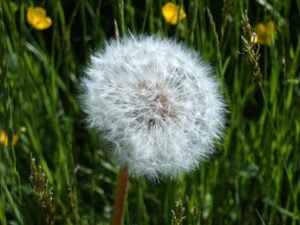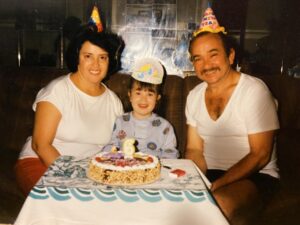I was scanning the children’s book reviews in Horn Book Magazine when my eyes fell upon the title Watercress (2021) by Andrea Wang. “A girl in cutoffs and a T-shirt is embarrassed when her parents stop the car to pick wild watercress growing by the side of the road; she doesn’t understand why her family has to be so different from everyone else,” read the summary in the review.
I knew I had to get my hands on this book—the word watercress plunged me deep into nostalgia. (“Watercress!” I hear my Puerto Rican grandma happily declaring in my childhood memories as she presents a bowl full of funny greens that look too wild and different for consumption.)
Watercress is a beautiful and layered picture book telling the story of a young girl ashamed of her parents’ actions—stopping the car randomly to pick watercress—because she doesn’t know the story of her parents’ past. But when her parents finally do share the trials they have suffered, when they reveal the secrets they have kept in order to spare their children from pain, the girl learns and grows. She sees her parents in a new light because she knows their story.
[When] her parents finally do share the trials they have suffered, when they reveal the secrets they have kept in order to spare their children from pain, the girl learns and grows.
Reading this book to my children also sent me straight back to another memory of backyard weeds. My grandparents used to scour our yard for dandelions. They were everywhere, of course, as all children adore plucking the flower stem when it goes to seed and blowing it to the winds. My grandparents would eagerly pluck the dandelion leaves and then wash them in our kitchen sink. “Look at all this! In your backyard!” my grandpa would joyfully exclaim. They would try to share their dandelion salad with us, but we couldn’t get over that it had grown uncultivated in our yard.
There’s an author’s note in the back of Watercress that I found just as beautiful as the story. In it, Wang explains that her parents kept their memories of China hidden from her, as they were painful and not easy to discuss with children. But then she says “Perhaps if I had known about the hardships they had faced, I would have been more compassionate as a child. Maybe I would have felt more empathy and less anger. More pride in my heritage and less shame. Memories have the power to inform, to inspire, and to heal.”
I so enjoyed this book. I loved it for my own watercress memories. I loved it for the unique way it presents history tucked into a family moment. I loved it for the parenting advice it gave me: share your story with your children.
Share this:

About Cécile Engeln
As Editorial Director, Cécile edits and manages the production of many American Ancestors and Newbury Street Press titles. She collaborated with D. Brenton Simmons to produce The Family Album: A Visual History of the New England Historic Genealogical Society, 1845–2020 (2020), and she edited Curt DiCamillo’s manuscript for his lovely new book A British Country House Alphabet: A Historical & Pictorial Journey, vol. 1 (2024). Cécile is also responsible for maintaining editorial accuracy and consistency in all our publications and marketing materials. She serves as Associate Editor on Mayflower Descendant and proofreads American Ancestors magazine. Cécile graduated with a BA in English literature and a minor in French from Andrews University in Michigan. She earned an MA in publishing and writing from Emerson College here in Boston. Prior to joining American Ancestors, Cécile worked in the educational textbook publishing industry. She developed and edited a variety of books, ranging from a guide to U.S. citizenship to graphic novels, and managed the production of complex foreign language programs.View all posts by Cécile Engeln →

